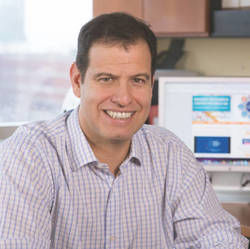Call Now Open
2026 Oxford-Harrington Rare Disease Scholar Award

Oncology
Creation of a New Class of Drugs to Prevent Breast and Ovarian Cancer
2013 Harrington Scholar-Innovator
“The excitement of discovery drives me on a daily basis,” says Roger A. Greenberg, MD, PhD, researcher in the Abramson Family Cancer Research Institute and associate professor in the University of Pennsylvania's Perelman School of Medicine. That excitement paired with years of diligent research at the laboratory bench has led Dr. Greenberg to identify the molecular basis for a potential new cancer treatment.
Dr. Greenberg has discovered an enzyme that is required to repair certain types of DNA damage that occur during the development of hereditary breast and ovarian cancer. He believes that he can inhibit this enzyme to create irreparable DNA damage in the cancer cells, causing the cells to die. This mechanism could be the foundation for new, more effective chemotherapy drugs.
The challenges inherent in any exploration of novel therapeutic approaches to cancer don't discourage Dr. Greenberg. In fact, the challenges intensify his interest in the research. “I think it's exciting to work on something that's novel, that's uncharted territory,” he says. He plans to apply his Harrington Discovery Institute Scholar-Innovator grant to navigate through that uncharted territory with additional work on refining the use of the enzyme against breast and ovarian cancer.
Dr. Greenberg's dedication to understanding the molecular basis of disease dates back to his undergraduate years at Haverford College in Pennsylvania. As part of a Howard Hughes Medical Institute program for interdisciplinary research, he had his first taste of scientific research.
Working for several years after graduation as a scientist with DuPont-Merck Pharmaceuticals piqued his interest in drug development and medicine, leading to his decision to attend medical school. But it was his work with renowned cancer researcher David M. Livingston, MD, at Harvard's Dana-Farber Cancer Institute after earning his medical degree that ultimately shaped his career as a physician-scientist.
“Dr. Livingston's focus is on the molecular pathogenesis of breast and ovarian cancer. The four years I spent with him deeply inspired my work at U Penn,” Dr. Greenberg says. Working with Dr. Livingston, Dr. Greenberg developed his research skills along with a special interest in DNA repair processes and their potential relationship to cancer treatment.
Now, after more than a decade of research, Dr. Greenberg believes that his work is at a crucial stage. Through the relationship-building opportunities that the Harrington Discovery Institute at University Hospitals Case Medical Center offers the Harrington Scholar-Innovators, he hopes to lay the groundwork for translating his laboratory discoveries into a powerful new cancer treatment.
It's important to Dr. Greenberg that the Harrington Discovery Institute Scholar-Innovator grant allows him free rein to follow his research wherever it leads, into that uncharted territory. “I get to apply what I love to do, which benefits humankind and is exciting on an intellectual level,” he says. “That is what really makes this very rewarding.”
“To develop the necessary expertise to do this on our own would be tremendously time-consuming, difficult to assemble and prohibitively expensive.”
Source: Article from 2012-13 Annual Publication.